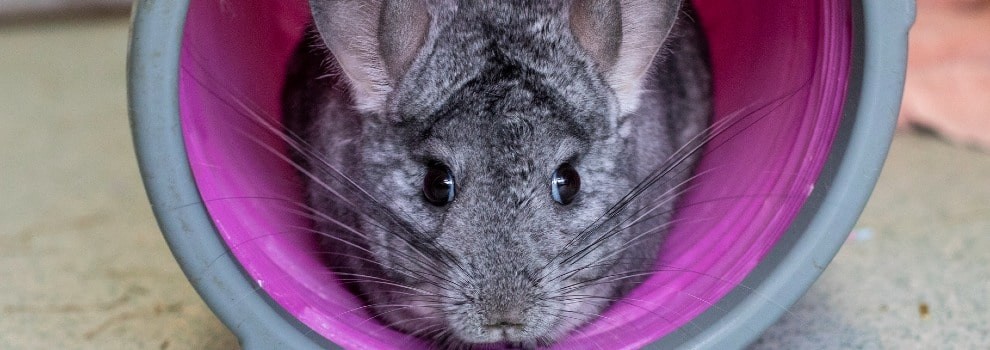- Find a Pet
- Advice and Welfare
- Ways to Give
- Get Involved
- What We Do
- Search
- My RSPCA
- Report a concern
- Gift in Wills
-
Colour modeVivid Calm
- Home
- Advice and welfare
- Pets
- Rodents
- Chinchillas
- Environment
Creating a good home for chinchillas
Originating from mountainous areas in South America, chinchillas are used to cool, cold and dry climates and have soft, dense fur to keep them warm. Keeping your pet chinchillas healthy and happy starts by creating a great home for them.

Housing
Your chinchillas' home needs:
- To be large and secure - such as a secure room or large metal mesh cage, with mesh floors as well as alternative flooring such as solid wood. Chinchillas can damage their feet when spending long periods standing on wire mesh.
- Exercise space - chinchillas are very active and agile and need lots of exercise space. Make sure they have plenty of horizontal and vertical space to run and jump.
- Branches and solid platforms at different levels to rest and jump on. Make sure there are no uninterrupted heights greater than 60cm to stop them from hurting themselves.
- Toys - chinchillas like gnawing and chewing, so give them wooden, rope, cardboard and pumice toys to chew. Avoid plastic toys.
- A dust bath - give your chinchillas a shallow tray filled with clean fine sand or 'chinchilla dust' to bathe in every day - this keeps their fur in good condition. Remove or sieve clean after use to stop it from getting soiled.
- Nest boxes and hiding places - give your chinchillas constant access to hay-filled nest boxes to rest and sleep in. Provide hiding places so they can get some time to themselves or escape if they're feeling scared.
- Bedding - chinchillas need enough bedding to keep warm, and it should be safe if they eat it, such as good quality, dust-free hay. Don't give chinchillas nesting materials that separate into thin strands, such as cotton wool or similar 'fluffy' bedding products, as they can get tangled up in them and they aren't suitable for eating.
Keeping your chinchillas' home comfortable
Make sure your chinchillas' home (and anywhere else they're left) is always comfortable for them by remembering to make sure it's:
- The right temperature - keep chinchillas indoors in well-ventilated, dry and draught-free housing, ideally at 10-18ºC. Chinchillas can become ill in hot, wet, humid, draughty or dirty conditions.
- Quiet - chinchillas need to be kept in quiet and calm areas away from dogs, cats, ferrets and other pets. They're a prey species, so they need to be able to hide in secure places, away from the sights and smells of predators. Chinchillas prefer routine, and they're quite shy and easily stressed if their home is near noise or activity.
- Clean - clean their cage regularly so that urine and droppings don't accumulate. Many chinchilla cages have trays underneath a mesh floor to make it easy to collect waste.
- Safe, secure and hazard-free - chinchillas are inquisitive and explore using their mouths, so make sure there aren't any hazards in their home that might hurt them. If they run freely around your house, always supervise them to stop them from harming themselves (such as by chewing electrical cables).
If you go away
If you're off on holiday, make sure you enlist the help of someone you trust to look after your chinchillas in their familiar home. If you do need to move them, make sure they're safe and comfortable while you're on the move.



